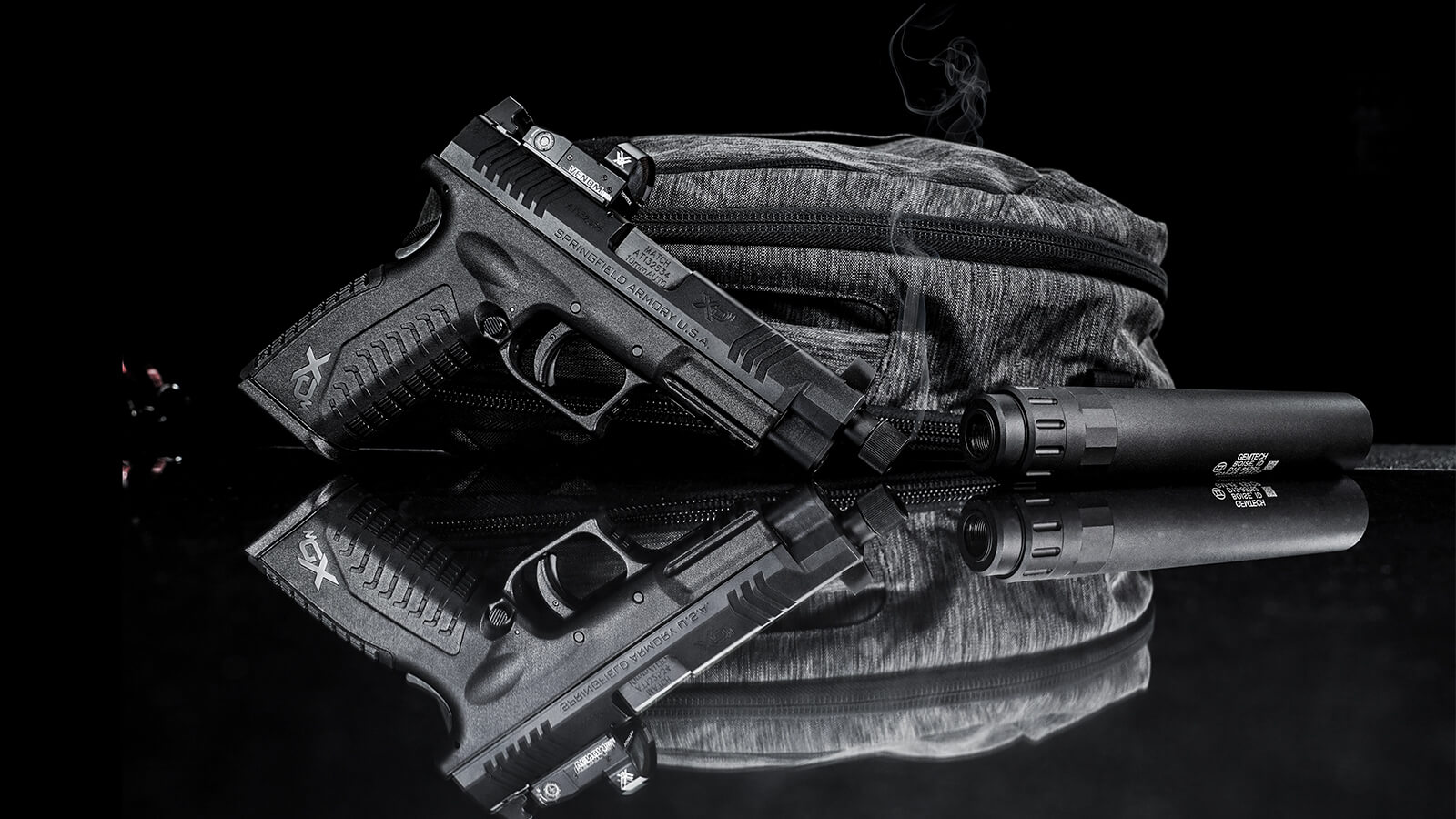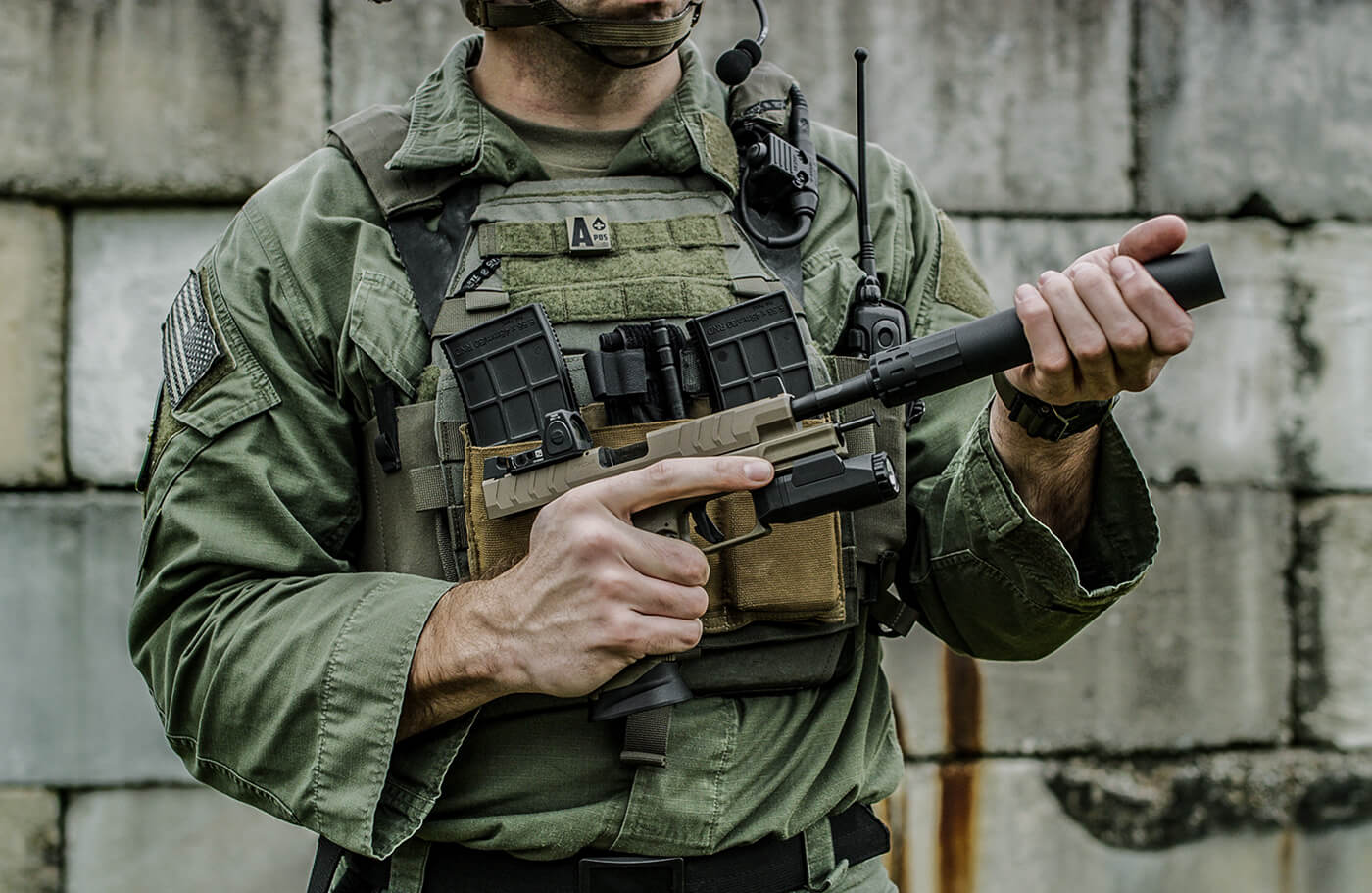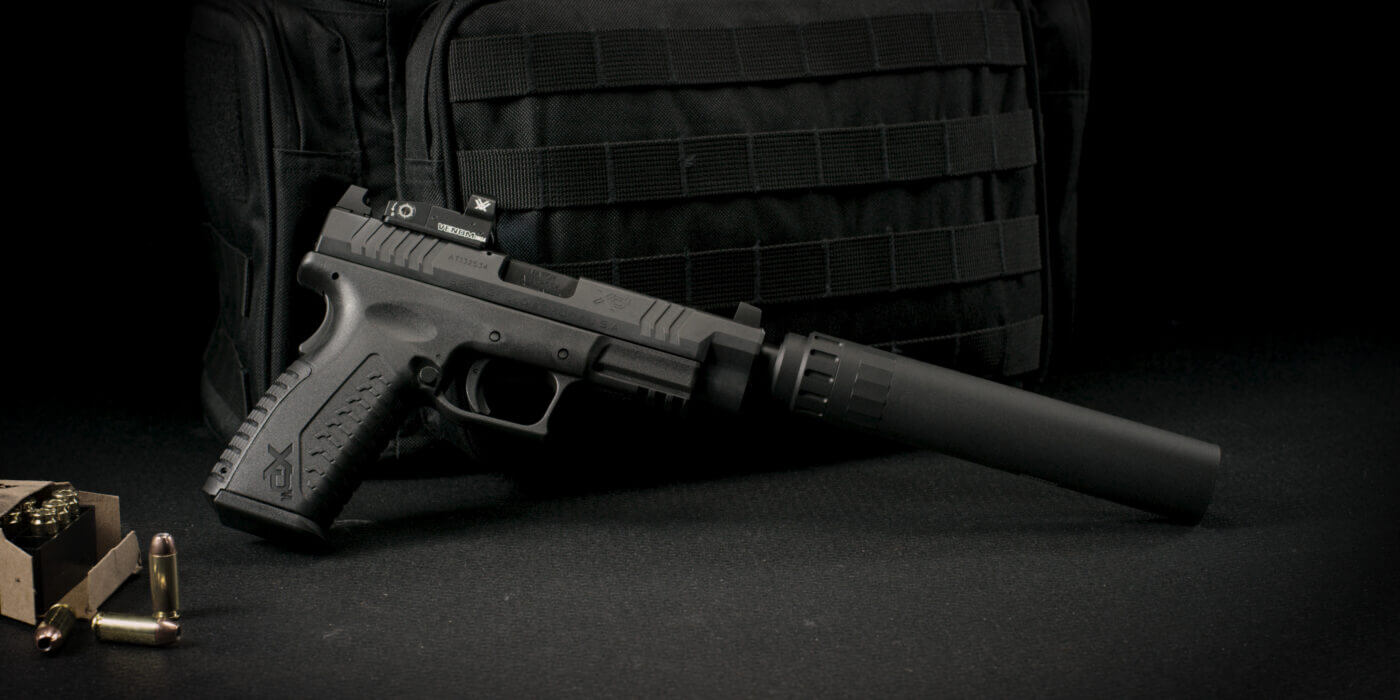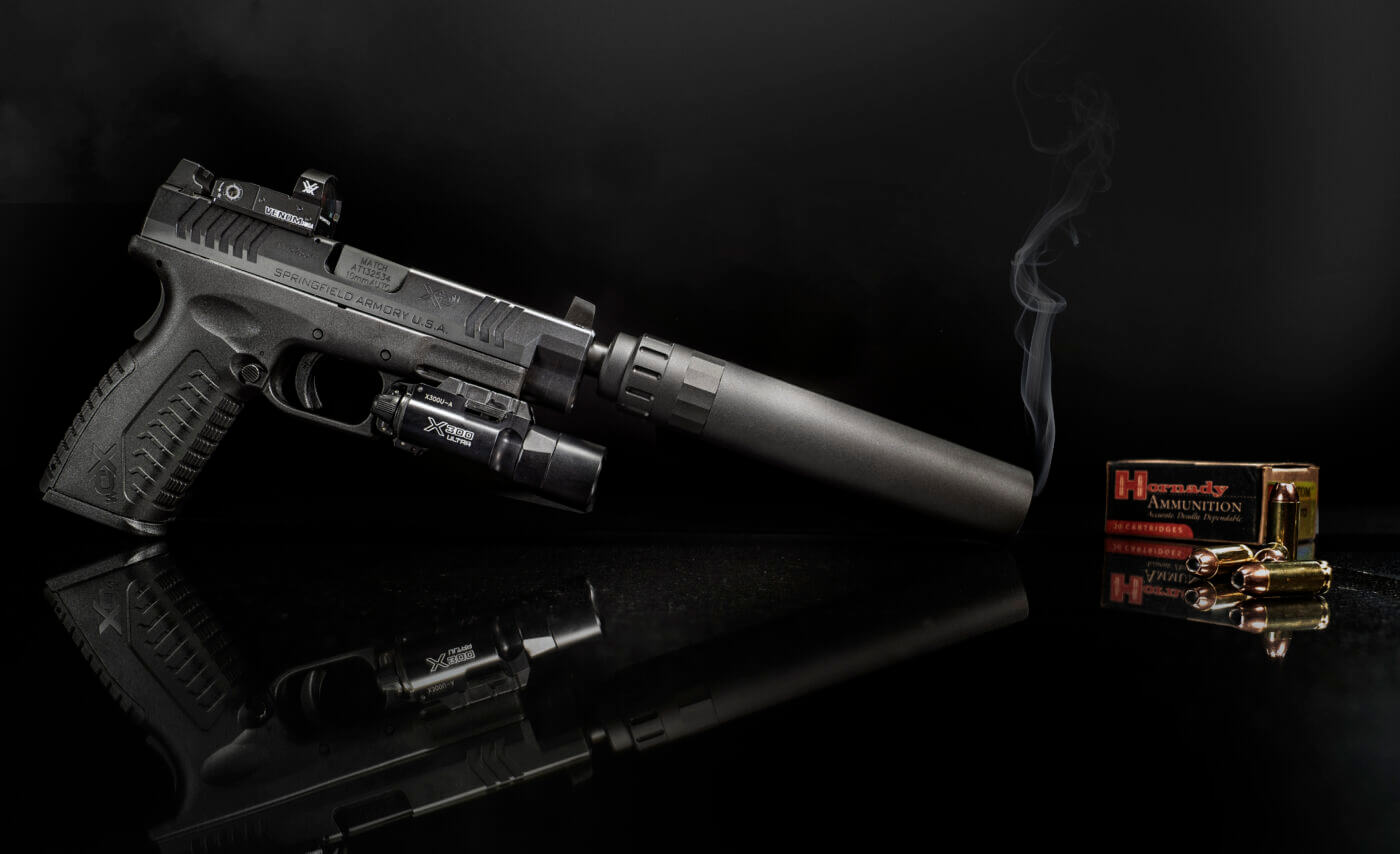Why Own a Silencer?
May 30th, 2020
7 minute read
Possibly the most maligned object in popular culture is the firearm silencer. Shown as the tool of assassins and rogue government agents, these sound suppressing devices have been cast as inexorably evil in a civilized community.
That begs the question: why own a silencer?
If only hitmen need to quiet their shooting, what possible need would the average shooter have with such an unholy object?

Let’s dive in and see if we can come to a reasonable answer.
Silencer vs. Suppressor
Before proceeding, let’s address the term silencer for just a moment.
A silencer is a sound suppression device that mitigates the noise damage produced by a gunshot. The first commercial sound attenuator for the firearm was introduced by Hiram Maxim in the early 1900s.
Called the Maxim Silencer, this sound suppression device was designed to reduce the noise of a rifle shot by diverting into its baffle system some of the gasses produced by the burning powder. Prices range between $5.00 and $8.50 depending on the model you purchased.
Although the most correct generalized term for this device may be “sound suppressor,” many people know the device by the brand name of Silencer. This is not unusual and can be seen in other products. For example, few people I know use the term “facial tissue” instead of the brand name Kleenex. Over time, the Maxim Silencer was shortened to just Silencer and moved into the public domain as a generic term synonymous with sound suppressor.
Throughout this article, I will use the terms interchangeably.
What Does a Silencer Do?
A sound suppressor is a device that either attaches to or is integral with the barrel of a firearm. Conventional suppressors allow gas from a fired cartridge to escape into baffles or expansion chambers. By doing so, the gasses slow and cool thereby creating less noise as they exit the gun than they would normally produce. If you are interested in the physics of this, Fred Mastison gives a more detailed explanation on how suppressors work.

Many things go into how well a sound suppressor works, but silencer efficiency is something that is greatly exaggerated in popular culture. A quality suppressor attached to the muzzle of a gun, may attenuate the noise by as much as 30-35 dB. This is significant, but it is not nearly the magical sound attenuation portrayed in novels and on the big screen.
Decibels, or dB, is a unit of measurement for sound intensity. It is a logarithmic scale, so moving from 100 dB to 110 dB is not a 10% increase, but rather ten times louder.
Gunfire is frequently measured at 160-168 dB – well above the safety threshold. By comparison, a gas-powered lawnmower is about 90 dB. If a highly effective sound suppressor reduces a 165 dB gunshot to only 130 dB, that suppressed gun shot is still many times louder than a lawn mower.
The point is that a silencer will reduce the noise created by a gunshot, but it is unrealistic to think that normal sound suppressors achieve results like those shown in movies.
The ammunition also plays a role. I’d recommend reading Tom McHale’s article where he explains why you might want to use subsonic ammo with a suppressor.
So, that brings us back around to the original question:
Why Would Someone Own a Suppressor?
Damping the amount of noise created by a firearm is a worthy goal. While Hollywood depictions of noise attenuation are unrealistic, using a silencer to suppress gunshot noise is worthwhile for the following reasons:
- hearing loss prevention
- improving range and training safety
- enhancing safety in a defensive shooting
- neighbor relations
Hearing Loss Prevention
A sound suppressor is an integral safety device for protecting your hearing.
Harmful noises come in a variety of forms that are often categorized by the characteristics of duration and intensity. In general, the higher the intensity the less duration is needed for permanent hearing loss.
Gunshots are impulse noises of short duration but extremely high intensity. A sufficiently intense single gunshot can cause permanent damage to your hearing.
As stated earlier, many gunshots fall between 160 and 168 dB. Experts generally agree that a single gunshot with a sound intensity of 140 dB or greater can cause immediate, irreversible hearing loss.

That doesn’t mean that you will lose all of your hearing with one loud gunshot. Instead, the loss is likely to be very small that builds with more noise exposure over time. Repeated gunshots can increase the amount of damage.
Suppressors can help mitigate the damage to your hearing by reducing the noise before it ever leaves the firearm.
You might suggest that a silencer offers the same protection as a set of hearing protective earmuffs. The best muffs can deliver about 28-32 dB of noise attenuation. Many sets offer less – typically 24 or 25 dB of reduction. For example, the Champion Vanquish Pro reviewed here at The Armory Life is rated for 24 dB of noise attenuation.
Depending on the quality of the suppressor, this would put the two devices in the same general range of protection.
However, people often don’t get the rated levels of protection from their muffs due to an improper seal around the ear from safety glasses or other objects. Here, the silencer is the superior form of hearing protection.
Further, the single suppressor protects everyone in the vicinity from damaging noise. I’ve known several people who were at a range and failed to put their muffs before other people shooting started. This momentary lapse of judgement had a permanent impact on their hearing. Suppressors prevent this accidental hearing damage.
The ideal situation is to use a gun mounted suppressor with earmuffs. These two safety devices would combine to provide even greater hearing protection.
Improving Range and Training Safety
One of the struggles that instructors and range officers have is being heard. Loud gunshots combined with sound-reducing earmuffs and earplugs makes it very difficult for shooters to hear range commands.
Sound suppressors reduce the volume of noise on the range and can even remove the need for individual hearing protection in some cases. This means that a range officer can give clear safety commands easily. When something goes wrong on the range, it is imperative that every shooter hear and understand the commands given.
Enhancing Safety in a Defensive Shooting
There are few defensive shootings where the defender has enough time to don hearing protection. In these cases, a firearm equipped with a silencer can be a major advantage.

A gun with an equipped suppressor is most likely going to be a rifle kept for home defense due to the size limitations of most concealed carry situations. However, shooting a rifle indoors is likely to provide the loudest, and most damaging, noise. So, a suppressor makes the most sense here.
Should you ever need to shoot a firearm in self-defense, the gunfire may reduce your hearing ability substantially for a short period of time. That makes it harder to communicate with your spouse or other family members or to hear where a suspect might be. Further, it diminishes your ability to communicate with a 911 operator.
Responding police officers may initially treat you like a suspect when they arrive due to miscommunication or other circumstances. It would be tragic indeed to have defended yourself against a home invader only to be shot by a police officer who you could not hear telling you to put your gun down.
Neighborhood Relations
As urban sprawl encroaches on traditional shooting areas and organized gun clubs, I’ve seen more and more lawsuits between homeowners and ranges. One of the complaints often cited is excessive noise from the shooting range. If shooters all used sound suppressors, the complaints would likely drop substantially.
Another consideration for those outside of the cookie cutter subdivisions is backyard pest control. If you have issues with rats or other varmints, a .22 rifle fitted with a sound suppressor would easily handle business without getting your neighbors riled up.
I use, for example, a rifle with an integral suppressor to dispatch rabbits that attack our large garden. Not only am I saving our food production plants from annihilation, but I am also putting meat on the table. Our land configuration allows me to harvest the rabbits safely with a suppressed rifle without causing a stir with a neighbor.
Final Thoughts
I’ve outlined just some of the reasons why reasonable people want sound suppressors for their firearms. All of these share the common thread of mitigating the harmful sound of a gunshot.
There are additional reasons why suppressors make sense. For example, a silencer can reduce recoil – a definite benefit when teaching new shooters. For me, the most important reason still comes back to hearing protection.
The firearms industry fully supports the use of suppressors, and they are legal in the vast majority of the United States. Check your state laws, and don’t be afraid to apply for the Federal tax stamp to own one. The process isn’t as hard as you think, and the results are well worth it.
Editor’s Note: Be sure to check out The Armory Life Forum, where you can comment about our daily articles, as well as just talk guns and gear. Click the “Go To Forum Thread” link below to jump in!
Join the Discussion
Continue Reading
Did you enjoy this article?

 137
137






